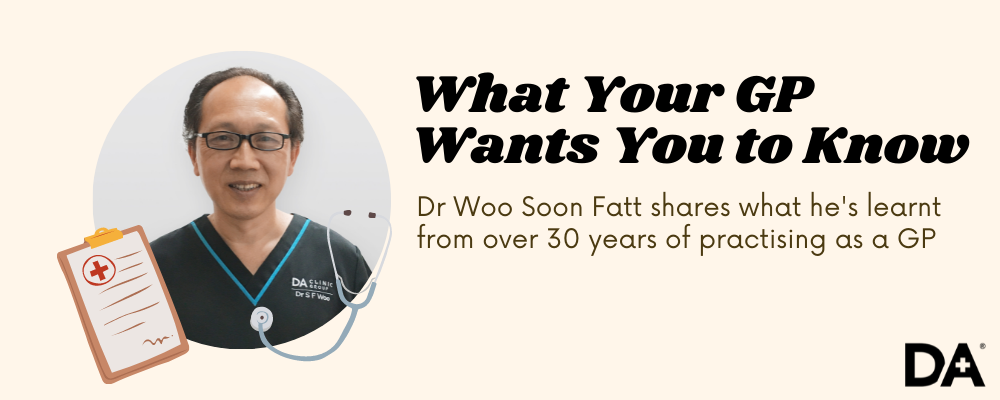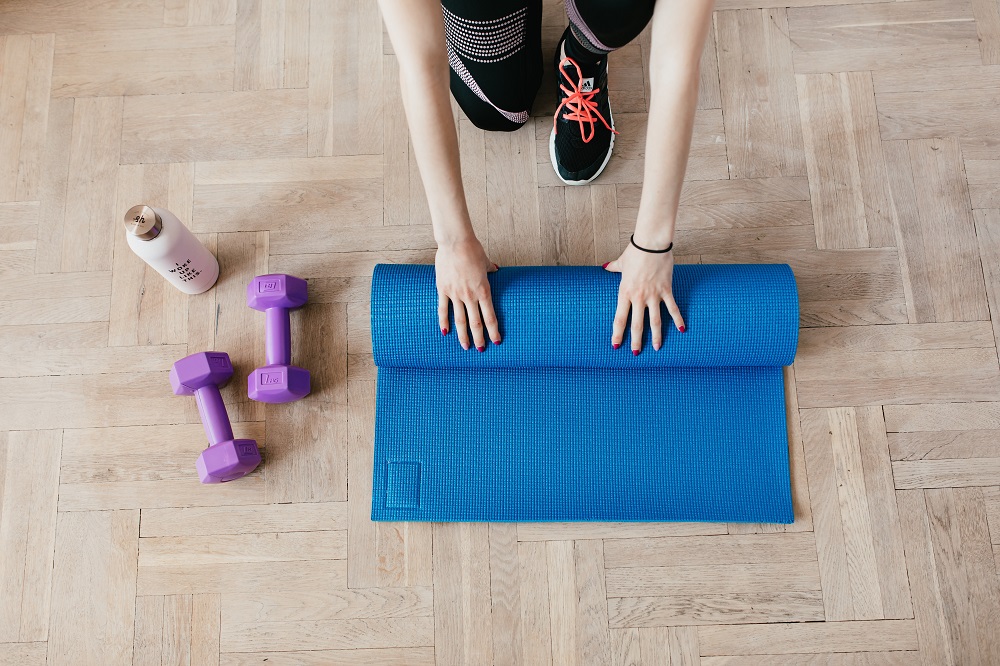Having practiced medicine for more than 30 years, Dr Woo Soon Fatt has seen countless patients across all types of ailments and health issues. On average, a GP doctor in Singapore sees about 1,500 patients in a single month. Now imagine that, multiplied by 30 years!
The DA Clinic Group anchor doctor shares with us some key insights he’s observed over the past three decades, and offer practical tips on how to maintain our health and slow down aging. This is everything your GP wants you to know about how to keep healthy and stay well for longer.

The doctor-patient relationship has changed for the better.
“Back when I was a medical student, the relationship was more like that between a parent and a child. The doctor tells you to do something and you just do it,” Dr Woo, who graduated in 1987, recounts. “Nowadays, it’s more a partnership. Both parties have a common aim and work towards it together.”
The shift in relationship is probably due to the easier access that patients have to health information, thanks to the Internet. Dr Woo adds, “It’s a change for the better as it also means patients are more motivated to look after their health.”
However, there are more younger people with chronic conditions.
Despite the growing interest in health, lifestyle-related illnesses, such as high blood pressure, high blood sugar and high cholesterol, have become more prevalent. “They’re occurring at younger and younger ages,” Dr Woo observes.
What can help alleviate this is through regular health screening. “Picking up signs of an early onset of diabetes at 20 years old is better than catching them only at 50,” says Dr Woo. Detecting a condition earlier means the patient can make the appropriate lifestyle changes to prevent their illness from worsening.
Lifestyle changes are key to keeping healthy.

Dr Woo recommends four important lifestyle pillars to stay healthy.
Pillar #1: Eat Well
“Man digs their graves with their teeth,” jokes Dr Woo, emphasising the importance of a balanced diet. “Unfortunately, eating healthy can be difficult in Singapore, where fast and cheap food with low nutrition quality is so easy within reach.”
Additionally, food is an emotional event for most of us. “We eat when we’re sad, we eat when we’re happy, we eat to celebrate,” Dr Woo says. “We also eat when we’re not celebrating anything.”
All of this makes it difficult to make healthier choices when we’re eating. Understanding how and why you eat can be a useful first step towards eating a healthier diet.
Pillar #2: Move Often
“A rough guideline is about 150 minutes a week, of moderately intensive activities. These activities should raise our heart rates to 80% of our maximum target heart rate,” advises Dr Woo. You can calculate your estimated maximum heart rate by subtracting your age from 220.
However, it’s also important to know your own limits and to exercise safely, especially if you have an existing health issue. “Exercise needs to be prescribed, especially for people with heart problems,” adds Dr Woo. “More is not always better.”
Pillar #3: Sleep Enough
“How to know you’ve slept enough? If you feel rested when you wake up, that’s enough,” quips Dr Woo.
“The average young person needs about 7 – 9 hours of sleep a day,” he adds. “Some older folks may only sleep for 3 – 4 hours a night but they can also take afternoon naps to make up for it.”
Sleeplessness is a common problem that plagues many Singaporeans. Adopting good sleep hygiene habits, such as putting away electronics an hour before bedtime, can help you to get a better rest at night.
Pillar #4: Avoid Harmful Substances
“Do not smoke, and drink less alcohol,” Dr Woo advises.
Smoking is incredibly damaging to the body and can lead to all sorts of health complications, including erectile dysfunction, cancer, lung and heart diseases and stroke. It can also result in the dulling of your senses, decreasing your enjoyment in life.
Similarly, overconsumption of alcohol can harm our organs. Drinking in moderation means no more than two standard drinks a day for men and one standard drink a day for women.
We need to be more aware of our body.
“While we seldom ignore pain, breathlessness or discomfort, we often ignore tiredness, change in bowel habits and dramatic weight loss,” Dr Woo says. The latter group of experiences can be a symptom for something more sinister, if it’s sudden and unexplained.
“Generally, everyone should try to be acutely aware of our own bodies to know if something is not right.”
Ask your doctor anything.

Although we may feel embarrassed at the clinic, depending on what our health conditions are, Dr Woo doesn’t think there’s anything we need to be shy about.
“Ask your doctor anything and everything under the Sun!”
With the DA app, seeing a doctor is more convenient than before. Our doctors are ready to see you anytime you need, 24/7, with medication delivery in three hours.







